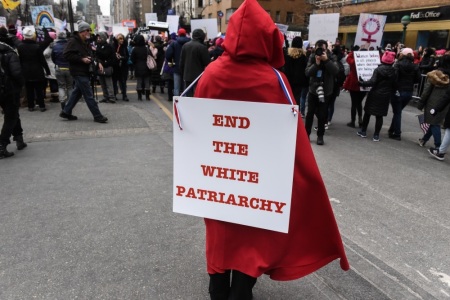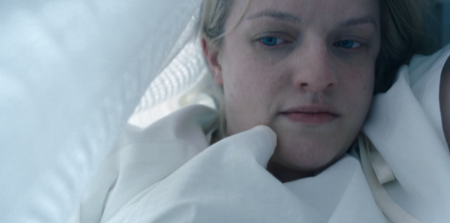'The Handmaid's Tale' is more conservative than you think

Spoiler alert: Key plot points from the first two seasons of Hulu's "The Handmaid's Tale" are revealed below.
Hulu's "The Handmaid's Tale" has become a symbol of progressive activism, but many of the show's storylines contain conservative themes.
Season one of "The Handmaid's Tale" was based upon Margaret Atwood's 1985 best-selling novel of the same name. Written shortly after the "New Religious Right" helped Ronald Reagan win the presidency in 1980, The Handmaid's Tale imagined a dystopian future in which the Religious Right takes control and establishes a theocracy.
Atwood has written a sequel, The Testaments, which will be published in September, but Atwood has said her new novel was not adapted from the TV show's second or third season, which begins Wednesday.
(This analysis is based upon the TV show, not the book, which I haven't read.)
In this near future story, the world is in chaos after fertility rates have collapsed. Parts of the former United States are taken over by totalitarian theocrats after a bloody uprising. This new nation is called "Gilead." Desperate for offspring, the leaders, "commanders," of Gilead establish a corps of "handmaids" to bear their children.
What does this situation most closely resemble in the real world today? Who, today, is taking advantage of women in desperate situations in order to have them bear children not their own? Hint: It's not conservatives.
A trend in liberal states is to legalize surrogacy, or womb rental, as a way for couples who can't have children, either for medical reasons or because they are a same-sex couple, to obtain a child by purchasing another woman's eggs and/or paying her to bear a child. But the process exploits women in desperate situations, who then must undergo a medically and psychologically risky procedure. (For more info, see here, here, and here.)
Additionally, progressives today often behave similar to theocrats, using the levers of government and business to punish those who dissent from progressive orthodoxy and to silence dissident voices. They try to make colleges "safe" from viewpoint diversity by banning speakers and groups. Conservative views are routinely stifled on the internet and in the media. If you disagree with a progressive, they say, you shouldn't be allowed to hold a government position, teach, or sell chicken sandwiches. They'll use whatever means at their disposal to force compliance.
When I watched "The Handmaid's Tale," the Gileadans reminded me more of today's progressives than conservatives.
The main storyline revolves around June Osborne (Elisabeth Moss), a handmaid, renamed "Offred," assigned to the Waterfords, Commander Fred (Joseph Fiennes) and wife Serena Joy (Yvonne Strahovski).
The Gileadans don't use IVF. The handmaids are raped in a pseudo-religious ritual involving a Bible and the commander's wives.
While the Gileadans exude religiosity, they actually disrespect Scripture and don't follow the teachings of Jesus. Bibles are kept under lock and key because women aren't allowed to read.
In season 2, a young female character named Eden surreptitiously reads the Bible, which ignites her faith and sets her on a path that leads to her execution. As a final act of defiance at her execution, she recites from heart part of 1 Corinthians 13, commonly known as the "love chapter," "Love is patient, love is kind ...."
In season 1, episode 8, "Jezebels," we learn that many of the commanders frequently visit a brothel. Some of the prostitutes, "Jezebels," are former handmaids.
While the show doesn't shy away from showing June's imperfections, she is a person of faith and becomes more devout as she tries to cope with her trauma, despite the fact that her oppressors claim to be Christian as well.
"The Handmaid's Tale" is also relentlessly pro-life.
When I see pro-abortion protesters dressed like the handmaids from the show, I wonder how closely they paid attention.
The "bad guys" of the show, the Gileadans, are obviously "pro-life" in certain respects. Singularly focused on procreation to the point of moral depravity, they're willing to commit rape in order to achieve their goals.
The amazing part, if you're expecting a story with a progressive message, is the handmaids love their unborn babies, the children conceived in rape.
People conceived in rape are unwanted, pro-abortionists often argue, and abortion restrictions should contain a "rape exception." They are the "1% used to justify 100% of abortions," as pro-life activist Ryan Bomberger, who was himself conceived in rape, put it.
June's first daughter, born pre-Gilead, was taken from her. In the gut-wrenching finale of season 1, June has become pregnant and Serena Joy shows her where her daughter is being held. "Listen to me," she tells June. "As long as my baby is safe, so is yours." Serena Joy is worried that June will try to abort her baby (which Serena Joy views as her own), so she threatens to harm June's firstborn if she tries.
(Side note: The unborn child's father is most likely not Fred but Nick, Fred's bodyguard, who was forced to have sex with June after Serena Joy suspected Fred was sterile. Nick and June later fall in love.)
It turns out that Serena Joy shouldn't have worried. June decides not to blame the unborn child for the circumstances of her conception.
In season 2 episode 5, June has some complications with the pregnancy. At first, she appears unsure what to think about that. Would it be better to lose the child? June is at her lowest moment in this episode. Feeling defeated after a failed escape attempt, she has accepted her fate. She becomes Offred. But at the hospital, she learns the baby would be fine. In one of the most touching moments of the show, she pulls the sheet over her head and talks to her baby girl.
"You're tough, aren't you?" she tells her. "Now you listen to me, 'kay? I will not let you grow up in this place. I won't do it. Do you hear me? They ... They do not own you. And they do not own what you will become. Do you hear me? I'm going to get you out of here. I'm going to get us out of here. I promise you. I promise."

The scene is shot beautifully. June lovingly caresses her baby bump. With a monitor attached, you can hear the baby's heartbeat as June, tears streaming, speaks to her.
Imagine that. In a show that has come to symbolize a rallying cry of the Left, the humanity of unborn people is fully and powerfully displayed. "They do not own you" is an acknowledgment that there is an individual human being, with human rights, growing inside her.
Two weeks ago, NPR supervising editor Mark Memmot posted an abortion style guide, informing reporters they must avoid indicating that a person who is not yet born is a human being.
"Babies are not babies until they are born. They're fetuses," wrote Memmot, seemingly opposed to synonyms.
The Hollywood Reporter and Refinery 29, not right-wing publications, used the words "unborn baby" and "her child," respectively, in describing that scene for their synopses of the episode.
The synopsis published by Vulture avoided using "baby" or "child," but wrote this about the scene: "And she has a rousing speech for the tough little papaya still in her uterus." The reader knows, however, that papaya doesn't mean an actual papaya but is a euphemism for a baby.
Another thing to understand about "The Handmaid's Tale" — it's deserving of all its accolades. The show won the Emmy for best drama series for season 1, and two Golden Globes for best television series, among many other awards and nominations.
Conservatives might be tempted to see those honors as part of the usual pattern of awarding the most "lefty preachy" type shows. Maybe its image as part of "the resistance" did play a role. But "The Handmaid's Tale" is among the best shows on television today. The acting, writing and directing are all excellent. Moss, especially, gave a noteworthy performance and won two Golden Globes. She had to become June, who is pretending to be Offred. So she's acting that she's acting, all the while giving clues to her true feelings through subtle facial expressions — not an easy task for an actor but Moss pulls it off superbly.
How did a supposedly progressive TV show end up with so many conservative themes? Are there closet conservatives running the show? I doubt it. There is still plenty in the show for progressives to cheer and conservatives to snark at. And from what I've read, those who make the show seem liberal.
The answer, I suspect, is that the writers, producers and directors are simply focused on making a compelling TV show, and to do that, they can't be focused on promoting a single political ideology. One reason there have been so many bad Christian movies is the filmmakers are too agenda focused to tell a good story.
The story must come first. "The Handmaid's Tale" could've, for instance, shown June becoming empowered by aborting her child, rather than her decision to raise and protect her child. But imagine June speaking to a dead fetus instead of the baby growing inside her. That would've been awful drama. Viewers root for heroines who fight for others, not just themselves.
A great story will always be one that we can all relate to, and that means including elements liberals and conservatives alike can appreciate.





















